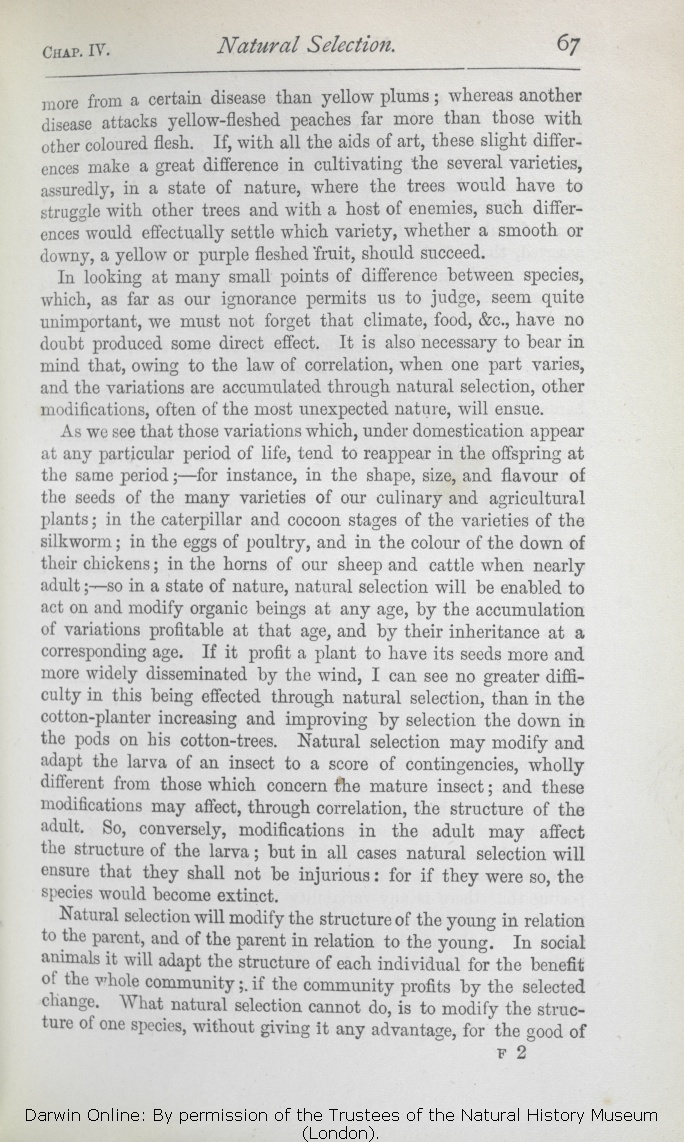more from a certain disease than yellow
plums, | plums, 1872 | | plums; 1859 1860 1861 1866 1869 |
|
|
In looking at many small points of difference between species, which, as far as our ignorance permits us to judge, seem
..| ..... 1860 1861 1866 1869 1872 | | to be 1859 |
| have no doubt 1872 |
| probably 1859 1860 1861 1866 |
| may have 1869 |
| produced 1869 1872 | | produce 1859 1860 1861 1866 |
| ..... 1869 1872 | | slight and 1859 1860 1861 1866 |
| is also 1869 1872 |
| is, however, far more 1859 1860 1861 1866 |
| that, 1869 1872 | | that 1859 1860 1861 1866 |
| owing to the 1869 1872 |
| there are many unknown 1859 1860 1861 1866 |
| law 1869 1872 | | laws 1859 1860 1861 1866 |
| correlation, 1869 1872 | | correlation 1859 1860 1861 1866 |
| OMIT 1869 1872 |
| of growth, which, 1859 1860 1861 1866 |
| varies, 1869 1872 |
| of the organisation is modified through variation, 1859 1860 |
| of the organisation is modified through variation 1861 1866 |
| variations 1869 1872 | | modifications 1859 1860 1861 1866 |
| through 1869 1872 | | by 1859 1860 1861 1866 |
| selection, 1869 1872 | | selection 1859 1860 1861 1866 |
| other modifications, often 1869 1872 |
| for the good 1859 1860 1861 1866 |
| OMIT 1869 1872 |
| being, will cause other modifications, often of the 1859 1860 |
| being, cause other modifications, often of the 1861 1866 |
| nature, will ensue. 1869 1872 |
| nature. 1859 1860 1861 1866 |
|
|
As we see that those variations
which, | which, 1872 | | which 1859 1860 1861 1866 1869 |
| shape, size, and flavour 1861 1866 1869 1872 |
| seeds 1859 1860 |
| seeds of the many 1861 1866 1869 1872 |
| many 1859 1860 |
| varieties 1859 1860 1861 1866 1872 | | va- rieties 1869 |
| variations profitable 1860 1861 1866 1869 1872 | | profitable variations 1859 |
| cotton trees. 1872 | | cotton-trees. 1859 1860 1861 1866 1869 |
| insect; and these modifications may affect, through correlation, the structure of the adult. 1872 |
| insect. 1859 1860 1861 1866 |
| insect; 1869 |
| 1 blocks not present in 1872; present in 1859 1860 1861 1866 1869 | | These modifications will no doubt
affect, through the laws of
correlation, the structure of the adult;
and probably in the case of those insects which live only for a few hours, and which never feed, a large part of their structure is merely the correlated result of successive changes in the structure of their larvæ.
|
| may 1869 1872 |
| will probably often 1859 1860 1861 1866 |
| they 1869 1872 |
| modifications consequent on other modifications at a different period of life, 1859 1860 1861 1866 |
| OMIT 1869 1872 |
| in the least degree 1859 1860 1861 1866 |
| were 1869 1872 | | became 1859 1860 1861 1866 |
| the 1869 1872 | | they 1859 1860 1861 1866 |
| species would become extinct. 1869 1872 |
| would cause the extinction of the species. 1859 1860 1861 1866 |
|
|
Natural selection will modify the structure of the young in relation to the parent, and of the parent in relation to the young. In social animals it will adapt the structure of each individual for the benefit of the
whole community; if the community | whole community; if the community 1872 |
| community; if each in consequence 1859 1860 1861 1866 |
| whole community; if this in consequence 1869 |
|









